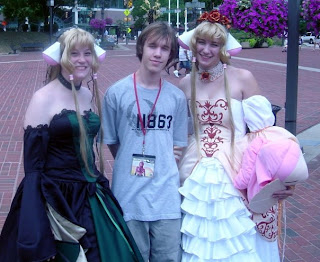Compared to the terrifying oral interviews that we're facing next week, this rehearsed speech project doesn't seem too bad. Anyway, I though the peer editing that we were assigned to do was even more helpful in conjunction with Sato-sensei's usual input. Since we as a class are all going to have to listen to each other's speeches, working with our own classmates helped us to write pieces that will hopefully be more enjoyable for everyone. Also, it's much less intimidating to receive input from our own classmates - it's easier to ask why they thought a certain change ought to be made, or even to argue to that person why a certain sentence or phrase should be preserved. Not to mention, peer editing is another great way to continue to get to know our classmates - I rather honestly believe that Sato-sensei does a good job of bringing all of us together as a community of friends.
I learned a few things even while I was editing other papers on my own. Putting myself in that kind of position, and focusing on the errors others had made, helped me to spot and correct a few errors in my own paper. Also, the fact that even the most well-written speeches had a few mistakes in them helped me understand why the written pieces I submit in class so often come back with a bunch of red marks on them. *laughs*
The only concern is that perhaps a few mistakes may have still managed to escape the notice of my peer editing group members and myself, but they can't be serious mistakes if they're that hard to catch. Now, the only issue is making sure that Sato-sensei comes away feeling as good about our speeches after hearing them as we did after writing and editing them.
2007年11月16日金曜日
ドラフト
I'm posting this speech that I'm supposed to turn in for a big grade in class, but I don't feel like I know enough Japanese, nor do I know it well enough, to create a winning narrative. But here we go. Maybe over the break I'll put some more serious focus into this. What I worry about is if it's okay to say that in high school, I didn't study "the Japanese people's Japanese" - is that an acceptable idiom in Japanese?
今日本ごのクラスはいいです。でも、むずかしいです。
こうこうの時に私は日本ごをべんきょうしました。でも、私のこうこうの日本ごのクラスはあまりむずかしくありませんでした。しゅくだいがたくさんありましたが、やさしかったです。テストもやさしかったです。ダイアロッグをぜんぜんかきましたから。
こうこうの時に私の日本ごのクラスのせいせきはよかったです。でも、私の先生は日本人じゃありませんでしたから、いい日本ごをおしえませんでした。一ねんせいの先生はアメリカ人の女の人でした。それから、二ねんせいの先生はかんこく人の女の人でした。だから、私は日本人の日本ごをはなしませんでした。よくありませんでしたね。
それから、私のこうこうの日本ごのクラスに一人がいました。私は一人でべんきょうして、よくありませんでした。だから、ともだちと日本ごをぜんぜんはなしませんでした。
でも、バージニア大学の日本ごのクラスはいいです。まい日私はいい日本ごをべんきょうします。さとう先生とかわい先生は日本人の日本ごをはなしますから。それから、今、私は一人でべんきょうしません。クラスのともだちといっしょにべんきょうします。時々スキットもやります。スキットはとてもこわいです。でも、私はスキットで日本ごをたくさんはなして、たのしいです。
今、日本ごのクラスにむずかしいしゅくだいがたくさんあります。むずかしいテストもありますから、私のせいせきはあまりよくありません。でも、バージニア大学の日本ごのクラスはたのしいです。私のこうこうの時のクラスはちょっとつまらなかったです。
今日本ごのクラスはいいです。でも、むずかしいです。
こうこうの時に私は日本ごをべんきょうしました。でも、私のこうこうの日本ごのクラスはあまりむずかしくありませんでした。しゅくだいがたくさんありましたが、やさしかったです。テストもやさしかったです。ダイアロッグをぜんぜんかきましたから。
こうこうの時に私の日本ごのクラスのせいせきはよかったです。でも、私の先生は日本人じゃありませんでしたから、いい日本ごをおしえませんでした。一ねんせいの先生はアメリカ人の女の人でした。それから、二ねんせいの先生はかんこく人の女の人でした。だから、私は日本人の日本ごをはなしませんでした。よくありませんでしたね。
それから、私のこうこうの日本ごのクラスに一人がいました。私は一人でべんきょうして、よくありませんでした。だから、ともだちと日本ごをぜんぜんはなしませんでした。
でも、バージニア大学の日本ごのクラスはいいです。まい日私はいい日本ごをべんきょうします。さとう先生とかわい先生は日本人の日本ごをはなしますから。それから、今、私は一人でべんきょうしません。クラスのともだちといっしょにべんきょうします。時々スキットもやります。スキットはとてもこわいです。でも、私はスキットで日本ごをたくさんはなして、たのしいです。
今、日本ごのクラスにむずかしいしゅくだいがたくさんあります。むずかしいテストもありますから、私のせいせきはあまりよくありません。でも、バージニア大学の日本ごのクラスはたのしいです。私のこうこうの時のクラスはちょっとつまらなかったです。
登録:
コメント (Atom)
